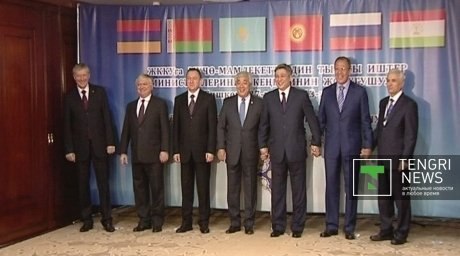On May 28, 2013, Kyrgyzstan hosted an informal summit of the heads of state of the Collective Security Treaty Organization (CSTO). The summit discussed various issues related to regional security, mainly the situation in Afghanistan – particularly the local measures needed to withstand the challenges related to the ISAF's withdrawal from Afghanistan in 2014. However, there was little information for the media on what exactly was covered at the high level discussions, but I can shed some light here on context and matters that relate to the summit.
First, the official CSTO press release said this was a summit of the heads of the CSTO member states of the Central Asian region. Perhaps this was just a convenient way to explain the absence of the presidents of Belarus and Armenia, though now one may question the definition of Central Asia as a region given the attendance of the Russian president. Observers relate this nuance to Bishkek’s continuous demands that Belarus extradite former president Kurmanbek Bakiev and his brother who face multiple criminal charges in their home country. The Belarus authorities have repeatedly refused to consider the extradition, with the latest statement coming less than a week ago from the Prosecutor General of Belarus, Aleksandr Konyuk, who stated that Bakiev is now a citizen of Belarus. Apparently, the row over the former president had its impact on Lukashenka’s decision to skip the summit, given the Kyrgyz authorities repeated claims that they would continue seeking the extradition of the Bakievs, including via the CSTO. Nevertheless, the Kyrgyz and Belarus presidents had a chance to exchange thoughts a few days later, in Astana, at the summit of EurAsEC.
Second, less than ten days before the summit, the Kyrgyz government made public its April 8, 2013, approval of a bill denouncing the Kyrgyz-U.S. agreement on the Manas Transit Center. Once endorsed by the parliament and signed by the president, the bill would cancel the Transit Center agreement effective on July 11, 2014. Whether that will come true is to be seen, while for now the Kyrgyz government had acted on time to confirm its intention to remove the Transit Center in 2014. The Russian deputy defense minister, also attending CSTO events in Bishkek, commented on the Transit Center, saying, “Everything regarding the Manas Transit Center was said, now we are waiting for relevant decisions,” and added, “I support all decisions taken by our presidents.” In the meantime, Eurasianet reports that U.S. officials are downplaying the importance of the Kyrgyz government’s bill, and saying that it is premature to comment on the situation
Also noteworthy, Tajik President Emomali Rakhmon arrived earlier to combine the CSTO summit with his official visit to Kyrgyzstan. Expectedly, the agenda of the bilateral talks mainly included the issues that united these two small and mountainous upstream states: water/energy and transport. A particularly new topic was the proposal of a Russia-Kazakhstan-Kyrgyzstan-Tajikistan railroad. President Atambaev took the issue to the CSTO, and apparently the heads of the states of the CSTO agreed to study the feasibility of the proposal. The very discussion of this unlikely railroad through mountainous Kyrgyz and Tajik territories, while the existing rail networks remain blocked by Uzbekistan, very much highlights the unfortunate current state of relations among the countries of the region.
Shairbek Juraev is the deputy director of the OSCE Academy in Bishkek. He blogs for PONARS Eurasia on Central Asian issues. The comments made and views expressed are solely the responsibility of the author.










